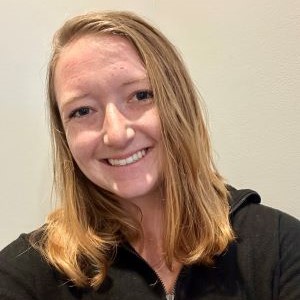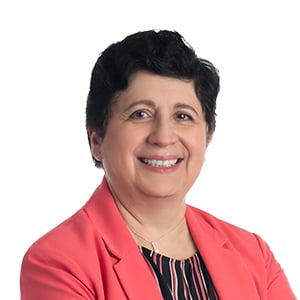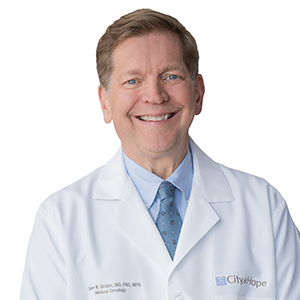
Bryn Cloud loves to ski, and she works hard during warmer months to keep in tip-top shape. So in March 2020, when symptoms stacked up — worsening lower-back pain, low-grade fever, a bulge in her stomach — it came as a surprise. Then in her early twenties, she worried that the cause was a virus that had been making headlines.
“I was convinced I was the first person in the Bay Area with COVID-19,” she said. “It was new and nobody understood it beyond the scary articles that were coming out.”
While the pandemic would affect her medical treatment, the diagnosis was more bewildering yet. During an ultrasound scan, local providers in Oakland, California, described multiple tumors all over her abdominal cavity, but further answers were not forthcoming.
After the shock of the ominous imaging report, Cloud’s family rallied around her. Her parents, aunt and uncle rushed to be with her in the moment of uncertainty. Meanwhile, her younger sister, then an undergraduate, expressed worry to the trusted mentor in whose research lab she worked: medical oncologist Stephen Gruber, M.D., Ph.D., M.P.H., City of Hope’s Eva and Ming Hsieh Family Director’s Chair of the Center for Precision Medicine, professor of molecular pharmacology and vice president of City of Hope National Medical Center.
“I’m always grateful for that connection that my family had to City of Hope,” Cloud said.
Gruber urged her to head to City of Hope right away. Her aunt arranged for her to travel on one of the last planes to take flight before COVID-related safer-at-home measures kicked in, and Cloud was driven directly from the airport to the main Los Angeles campus.
A Rare Dysgerminoma Diagnosis
There, she got a clearer picture of what was behind her symptoms. More sophisticated scans taken soon after her arrival showed a single mass larger than a football and led to a diagnosis: dysgerminoma, an extremely rare form of ovarian cancer that usually affects younger women of reproductive age and accounts for less than 1% of all malignant ovarian tumors. Surgeon-scientist Lorna Rodriguez-Rodriguez, M.D., Ph.D., a specialist in gynecologic malignancies and professor of gynecologic oncology at City of Hope, immediately stepped in to lead her treatment. Rodriguez-Rodriguez treats just one or two patients a year who present with dysgerminoma.

In addition to offering the best in oncologic care, Rodriguez-Rodriguez also embodied City of Hope’s commitment to compassion. Knowing that Cloud was hungry, having fasted for the sake of her scans, the doctor went out in her personal vehicle and brought back some soup for her patient.
“Everyone went above and beyond the night I got there,” Cloud said. “That personal touch meant the world to me. It made me feel safe and secure, like this is where I’m meant to be.”
On the following Monday, Rodriguez-Rodriguez successfully removed the tumor, which weighed 10 lbs. Working carefully, she was even able to preserve Cloud’s fertility in the process.
“It’s always been my hope to have my own children,” Cloud said. “It’s just incredible that the door isn’t completely shut on that for me.”
Genetic Testing Leads to Personalized Treatment
Gruber’s cancer genomics expertise added another bright spot: Genetic testing showed that there was no chance of passing the cancer on to future generations. Rather, Gruber identified a mutation in the tumor cells themselves that was driving the cancer growth — one that had never been seen in a woman before (the mutation is usually associated with testicular cancer).
This highly unusual finding was key to determining the best treatment for Cloud and exemplifies the benefit of applying precision medicine to patient care. City of Hope is the leading institution in the nation to provide comprehensive paired analysis of the DNA that patients are born with as well as the DNA that is unique to their tumors to better understand factors that could be contributing to their cancer.

City of Hope offers to sequence tumors from every patient it treats at the organization’s comprehensive cancer center in Los Angeles to determine its mutational signature. This information is critically important in helping physicians personalize treatment using targeted therapies approved by the U.S. Food and Drug Administration or medicines being studied in clinical trials.
In addition, the institution’s unique Precision Oncology Tumor Board allows patients to receive coordinated, multidisciplinary care from a group of leading experts in the precision cancer care field. The patient’s disease is also monitored over time and periodic genomic profiling conducted so that treatment can be modified as the tumor’s genomic profile changes (cancer cells typically continue to accrue mutations).
Thanks to these genomic insights, a personalized treatment plan was developed for Cloud. This began with an intense regimen of chemotherapy to eliminate any traces of cancer. She persevered through four rounds of treatment, each involving numerous eight-hour infusions over the course of weeks. On top of side effects, Cloud also had to deal with the isolation of pandemic-related safety measures that precluded in-person visits from family. She did have a source of comfort close at hand, though.
“The nurses became my family,” she said. “That personal attention was so important for me during that time.”
Recovery, and a return to athleticism, took time. Back in the Bay Area, Cloud was spurred to look a little less before leaping and made a quick succession of changes: switching roles at her employer, Tesla; purchasing a house in the mountains where she can enjoy hiking and taking in the views; and adopting a dog. Happily, she loves where she landed.
“I have no regrets,” she said. “City of Hope is the best care that I could have ever gotten. I never wavered about that. Those decisions all took me to the next step of who I wanted to be.”
Cloud encourages young adults early in their careers to do as she did and get a strong health insurance package. She also feels as though she wrote off symptoms, such as alterations in her menstrual cycle, and urges young people to seek medical advice when they notice a change in their health.
If she could go back and give her freshly diagnosed self any words of wisdom?
“I’d say, ‘Trust in yourself. You’re stronger than you think.’”
